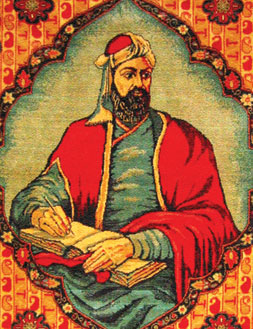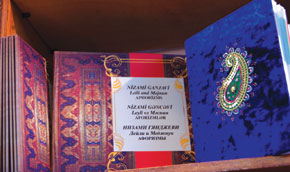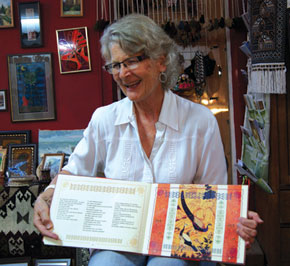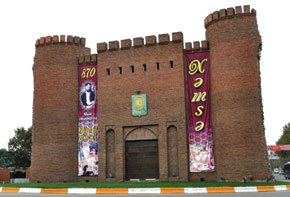 Once upon a time there was a great lord, who ruled over the Banu Amir.
Once upon a time there was a great lord, who ruled over the Banu Amir.He was a very kind-hearted man and liked to help the poor.
However, he was childless.
At last he was given a son, who was as beautiful as a full moon after fourteen days.
His parents called him Gheis
This is a short extract from Leyli and Majnun, the poem of the great Azerbaijani writer Nizami Ganjavi, as translated by Ragnhild Thori, a Norwegian volunteer who has been in the country for a few years. She worked as director of the Ganja International School, but has since moved to Baku to prepare a book about Nizami, her favourite poet and for her the world’s best philosopher. The advantage of her book is that it is intended for all: adults and children alike can easily understand its content.
How it all began…
Ragnhild Thori ventured from her homeland at the turn of the new century at a time of a boom for Azerbaijan’s oil and gas industry, when opportunities opened up here for foreign specialists from over the world. Invited to work here, especially in the oil sector, foreigners brought their families here as well. Some settled in Ganja, where Nizami Ganjavi was born, lived and worked in the 12th century. By the way, Ganja was then a major cultural and commercial centre for the whole Near and Middle East. The city is thought to be one of the oldest in Azerbaijan: it celebrated 2500 years since its foundation in 2006.
Ragnhild was invited to head a school for English-speaking children in Ganja. From the first day she was entranced by Ganja. She began to learn more interesting things about the city and finally she discovered Nizami Ganjavi for herself.
Ganja as I have learned was at that time (12th century) bigger city than Baku and was a scientific centre within the Persian Empire. There were lots of wise men and Nizami was the greatest of them all. When I first came across his great love drama ‘Leyli and Majnun’, I forgot that he was born in the 12th century and thought he must have got his idea from Shakespeare’s drama ‘Romeo and Juliet’. But it seems to have been the opposite way.
Increasingly drawn into the work of Nizami, she began to think more and more about a book on Leyli and Majnun - a book that could open up to readers the world of the seeker after truth, Nizami. As Ragnhild told us, while she was working at the school, some international guests arrived on a visit. The Norwegian Ambassador was among them. When he arrived in Ganja and saw her drafts for the book, he said
Wow! This is a book I would like to have on my desk for guests.
Thus he understood the aim of the book and offered support for its printing.
Actually, the idea of a book came gradually. There were local teachers in the school who urged her to write a book in English by adapting Nizami’s poem to use in the children’s English lessons.
Later on we worked out a version for puppet theatre with the Ganja State Puppet Theatre, who also made professional puppets for us. When people saw the performance, they liked it very much and wished they had a copy of the book. Commemorating the 870th anniversary of Nizami’s death, I saw an opportunity to celebrate this great poet by having both the book and the puppet theatre version of ‘Leyli and Majnun’ printed and presenting it to the world in English, Azerbaijani and Russian. With this book I want children and adults, especially Azerbaijanis, to enjoy their own beautiful culture.
The poet, the philosopher, the truth seeker…
But before that Ragnhild learned more about Nizami’s works. She tried to reach an understanding of Leyli and Majnun within the philosophical approach he applied to everything he did. Some of this came from his autobiography, some from his famous Khamsa – five poems which turned a new page in the cultural history of the Eastern peoples - some from the descriptions of others with deep knowledge of his work.
When I learned about this amazing man Nizami he made a great impact on me, because he was a wise man. You know to be wise it is sort of seeking of the truth and conveying it to people.
As well as being a great poet and philosopher, for Ragnhild he became a great truth seeker. She never tires of talking about him, as she said, he was an original thinker with ideas far beyond his time. In fact Nizami was one of the first to raise his voice against injustice and despotism. He wasn’t afraid to say what he thought to mighty rulers. He threatened tyrants who oppressed their own people and shed the blood of innocent people.
The same was true of ‘Leyli and Majnun’. He would protest against those who tyrannize love. Generally, when I talk about Nizami, the book touches the souls of Azerbaijanis.I describe it as a cultural pearl in their souls.
Inspired by a poem
Her eyes were like those of a gazelle
And her hair was dark as the night.
Her name was Leyli.
Later Gheis fell in love with Leyli
And so did she with him
In Ragnhild’s interpretation the poem depicts the conflict between the selfless and vulnerable love of two young people, Leyli and Majnun, and the stiff moral norms and traditions of the time. The way Majnun showed his love was unacceptable according to those customs. He is thrown out of his family, rejected by his friends and regarded as a bad character. So he runs away to the desert to live among the wild beasts. He was given the new name Majnun which, in Arabic, means mad.
Gheis had no peace in his heart.
His love for Leyli made him lose his mind.
People did not understand this unusual love,
So they spoke badly
People finally gave Gheis a new name – Majnun
Leyli manages to hide her true feelings. She obeys her parents and marries a man she does not love. Outwardly she seems alright, but she suffers from an internal struggle between her parents’ will and her love for Majnun; this finally leads to her death. Majnun hears about this and goes to her grave. His heart is broken and he dies there. Majnun’s great love for Leyli was too much for unenlightened medieval society.
When Majnun heard about Leyli’s death, he hurried to her grave.
He watered it with his tears.
Leyli’s death broke his heart – he died.
Majnun’s friends, the wild animals, did not allow anyone to touch his body.
Not until one year later did the animals move away.
Then people came and buried Majnun in Leyli’s grave.
At last they were together!
 Why do they do that? Why do people act like that? How can they do that? – Ragnhild seems to be questioning herself.
Why do they do that? Why do people act like that? How can they do that? – Ragnhild seems to be questioning herself. It’s a big question that opens up the basics of life for all people – ordinary workers and rulers, intelligent and ignorant, children and adults. It is true that in society there are always wise people who try to protect love – like the wild animals in Nizami’s poem. Because love is something that saves the world, even though people who inhabit it don’t understand it. Love is great. Nothing can kill love. Even conventions, let’s call them traditions, can kill people but they cannot kill love.
True love never fails!
The more Ragnhild discovered for herself in Leyli and Majnun, the more it inspired her for the book. As she told us, while learning about the poem she found in Nizami the best psychologist. To put it another way, he was working deep in the human psyche concerning love. It’s great. I have written a little in the book about why I love the poem…because it tells society that it is not treating real love in a good way.
In the book there are some miniatures illustrating the poem. One of them shows two peacocks - Ragnhild sees in them images of Leyli and Majnun, images of life and beauty.
True love lasts forever. So I ended with Nizami’s words: –
True love never fails! True love is stronger than death!




